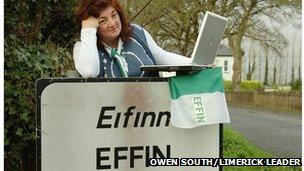Effin in County Limerick seen as 'offensive' on Facebook
- Published

Ann Marie Kennedy is struggling to add Effin as her 'home place' on Facebook
For most people adding the name of where they live on Facebook is relatively straightforward.
A problem, however, arises when the place where you live is seemingly branded as offensive by the social networking site.
One woman from Effin in County Limerick in the Irish Republic has so far been unable to add the village name to the 'home place' section of her Facebook profile.
Ann Marie Kennedy, who works in the department of nursing and midwifery at the University of Limerick, has now started an online campaign to to get Effin recognised.
"I was born and raised in Effin and my family come from here," she said.
"There's a great community spirit. Our best known export is Effin cheese.
"It's a great little parish. I'd just like to put down (on Facebook), because I'm from Effin, and so would so many Effin people around the world, that they're from Effin.
"But Facebook won't let it because they think it's obscene or offensive," she added.
Online campaign
The 47-year-old Effin native said the site keeps giving suggestions such as Effingham, Illinois; Effingham, New Hampshire when she attempts to add her hometown.
She has now started an online Facebook group called 'Please get my hometown Effin recognised'.
Ms Kennedy now lives in Banogue but hopes to move back to Effin. "I'm a proud Effin woman and I always will be an Effin woman," she said.
Although she recognised the pun "is funny", she said it "is not as funny as other people find it".
"We are used to it, although the name originated from a saint," she said.
Ann Marie Kennedy, has been trying since June to get her home town Effin recognised by Facebook
The BBC contacted Facebook who said it "doesn't think that 'Effin' is offensive" and are investigating the particular case.
A spokesman said: "From time to time we are alerted to oversights such as this in our mapping system. We will look to correct it to ensure places like Effin can be 'liked' on Facebook."
The village of Effin has a population of around 1,000 and is about 40km south of Limerick city near Charleville.
It has been suggested that the village's name origins lie in Cill or Teampaill Eiffin, meaning the Temple or Church of St Effin.